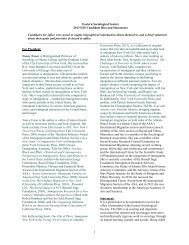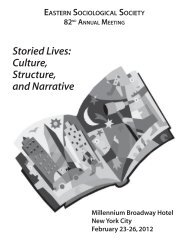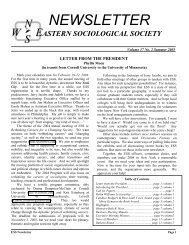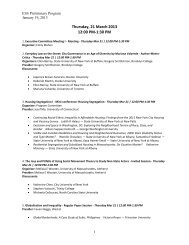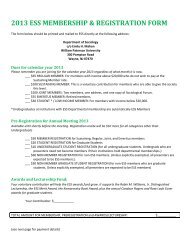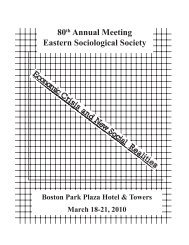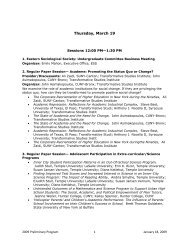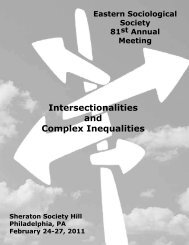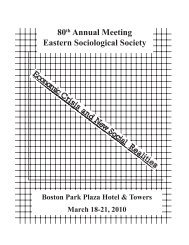Candidate Bios - Eastern Sociological Society
Candidate Bios - Eastern Sociological Society
Candidate Bios - Eastern Sociological Society
Create successful ePaper yourself
Turn your PDF publications into a flip-book with our unique Google optimized e-Paper software.
<strong>Eastern</strong> <strong>Sociological</strong> <strong>Society</strong><br />
2004 ESS <strong>Candidate</strong> <strong>Bios</strong> and Statements<br />
<strong>Candidate</strong>s for office were asked to supply biographical information about themselves and a brief<br />
statement about their goals and priorities if elected to office.<br />
______________________________________________________________________________________<br />
For President<br />
Nancy A. Denton is Associate Professor of<br />
Sociology and Associate Director of the Center<br />
for Sociology and Demographic Analysis at The<br />
University at Albany, State University of New<br />
York. She received her undergraduate education<br />
at Le Moyne College in Syracuse, NY and<br />
earned an MA from Fordham University before<br />
completing her Ph.D. at the University of<br />
Pennsylvania. Prior to coming to Albany in<br />
1990, she did post doctoral work at the<br />
University of Pennsylvania and the University of<br />
Chicago. Her research and teaching interests<br />
focus on issues of race, place, and inequality and<br />
she has published numerous articles on these<br />
topics in sociology journals as well as law<br />
reviews. Together with Douglas Massey she is<br />
the author of American Apartheid: Segregation<br />
and the Underclass (Harvard, 1993), which won<br />
the 1995 Distinguished Scholarly Publication<br />
Award from the ASA. She recently edited<br />
American Diversity: A Demographic Challenge<br />
for the Twenty-first Century (SUNY Press, 2003)<br />
with Stewart Tolnay. Some recent articles<br />
include: “Housing as a Means of Asset<br />
Accumulation: A Good Strategy for the Poor?”<br />
(In Assets for the Poor: The Benefits of<br />
Spreading Asset Ownership, Shapiro and Wolff,<br />
editors, 2001, Russell Sage) and “Half Empty or<br />
Half Full: Segregation and Segregated<br />
Neighborhoods 30 Years After the Fair Housing<br />
Act” (In Cityscape 4:107-122). One of her<br />
current projects is the examination of the<br />
geography of opportunity for the nation’s<br />
children, focusing especially on immigrant<br />
children. Because of her research on race,<br />
segregation, and housing issues, she has<br />
frequently appeared as a keynote speaker for<br />
local Fair Housing organizations, as well as at<br />
numerous national public conferences. In the<br />
ASA she was elected to the Council for a threeyear<br />
term, and to the Committee on Committees.<br />
A member of the Community and Urban, Racial<br />
Minorities, Population, and International<br />
Migration sections, she has chaired the<br />
Community and Urban Sociology section and<br />
helped to found its new journal City and<br />
Community; she also chaired the Duncan award<br />
committee for the Population section. In ESS<br />
she served as the Program Chair for the 1998<br />
meeting and the Chair of the Graduate<br />
Committee for the last two years.<br />
“ESS was the first professional meeting I ever<br />
attended. I had finished my MA and was<br />
teaching at a small liberal arts college. I can still<br />
remember how in awe I was at seeing all the “big<br />
names” whose work I had been reading. Little<br />
did I know then that I would one day have the<br />
honor of running for President of the ESS. From<br />
that time, now about thirty years ago, I have<br />
always had a special fondness for the ESS. There<br />
is something about the group of scholars who<br />
attends the meetings that always serves to<br />
challenge me intellectually, at the same time as I<br />
renew old friendships and make new ones. In<br />
part, I think this is because the meetings of the<br />
society focus so heavily on two essential<br />
components of the sociological enterprise:<br />
fostering the careers of graduate students and<br />
assisting sociologists to stay intellectually vital<br />
and engaged. Should I be fortunate enough to be<br />
elected President, I would try to maintain the<br />
positive momentum of the society in several<br />
ways. First, I would seek to increase<br />
membership, largely because I want others to<br />
have the wonderful experience of being part of<br />
this organization. Reaching out to sociologists in<br />
our area who are not currently members could<br />
also lead to new ideas as to what the society<br />
might do. Second, I would continue the practice<br />
of recent presidents of attracting prominent<br />
sociologists to attend the annual meeting, both<br />
from the U.S. and abroad, as a way of spurring<br />
discussion on the latest research and ideas.<br />
Together with <strong>Sociological</strong> Forum, the annual<br />
meeting is really the heart and soul of the ESS.<br />
Third, I want to work with the officers and<br />
members to find new ways to continue the<br />
wonderful job ESS does of enhancing the<br />
dialogue between new and established scholars.<br />
All three of these things are essential because<br />
ESS covers a region where immigrants from<br />
around the world are rapidly changing the
demographic and social landscape in places large<br />
and small. We must work not only to include<br />
these new groups, but understand how<br />
race/ethnicity-gender-and class operate in our<br />
changing region, and how we can best study and<br />
teach about it.’<br />
George Ritzer is currently Distinguished<br />
University Professor at the University of<br />
Maryland (in March, 2004 he will receive an<br />
Honorary Doctorate in Sociology from LaTrobe<br />
University in Australia). He has his doctorate<br />
from Cornell University (1968) and is especially<br />
proud of his diploma from the Bronx High<br />
School of Science and his Bachelor’s degree<br />
from CCNY. Ritzer has been a Professor at<br />
Maryland since 1974. Previously, he was<br />
Associate Professor at the University of Kansas<br />
(1970-1974) and Assistant Professor at Tulane<br />
University (1968-1970). He has held a Fulbright<br />
at Erasmus University in the Netherlands, a<br />
Fulbright Chair at York University, Canada, the<br />
UNESCO Chair in Social Theory at the Russian<br />
Academy of Sciences, and was Fellow-in-<br />
Residence at the Netherlands Institute for<br />
Advanced Study and the Swedish Collegium for<br />
Advanced Study in the Social Sciences. He has<br />
been a Visiting Professor at the Universities of<br />
Shanghai (China), Surrey (England), Tampere<br />
(Finland), Bremen (Germany) and Nuoro<br />
(Sardinia, Italy). In addition, he has given<br />
innumerable invited speeches throughout the<br />
United States and the world, including the 2003<br />
keynote address to the meetings of the British<br />
<strong>Sociological</strong> Association. The American<br />
<strong>Sociological</strong> Association honored him with its<br />
Distinguished Contribution to Teaching Award<br />
in 2000 (relatedly he has won all of the major<br />
teaching awards at the University of Maryland)<br />
and he has served the Association in various<br />
capacities, including Chair of its sections on<br />
Theoretical Sociology and Organization and<br />
Occupations.<br />
His books (he has also authored over 80 articles,<br />
many in refereed journals) fall into four broad<br />
areas. He is perhaps best known for a series of<br />
books over the last decade that involve the<br />
application of social theory to the contemporary<br />
world, especially the realm of consumption.<br />
Those works include The McDonaldization of<br />
<strong>Society</strong> (soon to be published in its 4 th , "revised<br />
new century” edition, translated into more than a<br />
dozen languages, and featured in virtually all<br />
current introductory sociology textbooks and<br />
excerpted in most anthologies for that course and<br />
many others); Enchanting a Disenchanted<br />
World: Revolutionizing the Means of<br />
Consumption (2 nd edition forthcoming in 2005);<br />
Expressing America: A Critique of the Global<br />
Credit Card <strong>Society</strong> (1995), as well as the most<br />
recent addition to that list, The Globalization of<br />
Nothing (2004). Also in this realm, Ritzer is cofounding<br />
editor of the Journal of Consumer<br />
Culture.<br />
The work in the sociology of consumption is<br />
derived from a prime interest in theory and<br />
metatheory. In terms of the latter, he published a<br />
series of monographs including Sociology: A<br />
Multiple Paradigm Science (1975; 1980),<br />
Toward in Integrated <strong>Sociological</strong> Paradigm:<br />
The Search for an Exemplar and an Image of the<br />
Subject Matter (1981), and Metatheorizing in<br />
Sociology (1991). His most recent effort in this<br />
area is the co-authored "The Nature of<br />
Metatheory" in Jonathan Turner (ed.), Handbook<br />
of <strong>Sociological</strong> Theory (2001). Also in that year,<br />
Sage published two volumes of his collected<br />
works, one in theory (and metatheory), the other<br />
in applications of theory to the sociology of<br />
consumption.<br />
The third domain of his work is a series of<br />
textbooks and anthologies for a number of<br />
different courses, especially introductory<br />
sociology and sociological theory. His coauthored<br />
introductory sociology text went<br />
through seven editions, and his various texts in<br />
sociological and social theory have been<br />
standards for decades and, in two cases, are in<br />
their sixth editions. He also authored texts in<br />
social problems and the sociology of work (three<br />
editions).<br />
Finally, there are a number of edited volumes for<br />
the profession including Frontiers of Social<br />
Theory (1990), the Blackwell Companion to<br />
Major Social Theorists (2000), the co-authored<br />
Handbook of Social Theory (2001), the<br />
Handbook of Social Problems (2004), and the<br />
forthcoming, two-volume Encyclopedia of<br />
Social Theory. He has recently completed<br />
negotiations with Blackwell to edit a six-volume<br />
Encyclopedia of Sociology.<br />
The ESS (indeed all professional societies) faces<br />
a new and very severe round of crises with the<br />
budgetary problems in most states and the<br />
resulting economic problems at state-supported,<br />
and many private, universities. We must address<br />
the challenge of finding new ways for<br />
undergraduates, graduate students and faculty<br />
members to be able to afford to attend our<br />
meetings. The obvious alternatives are to find
new funding sources and/or to explore new, less<br />
expensive sites (e.g., university campuses) for at<br />
least some, or some part, of our meetings. While<br />
virtually all members would benefit from such<br />
innovations, it would be especially beneficial for<br />
those least able to afford to attend, in particular<br />
graduate students and junior faculty members.<br />
At the same time, there is the continuing<br />
challenge of getting greater participation from a<br />
broader range of colleges and universities in the<br />
East. I would appoint an ad hoc committee to<br />
investigate new ways of encouraging attendance.<br />
What is needed, I believe, is for sociologists in<br />
the region to come to see attendance at the ESS<br />
annual meeting as normative. We must invite and<br />
encourage their regular participation including<br />
organizing sessions, presenting their work,<br />
serving as discussants, and so on.<br />
Relatedly, I am told that the major book<br />
publishers are now more likely to eschew<br />
participating in the book exhibits at the ESS<br />
meetings than at the other major regional<br />
meetings. For many, the exhibit area is not only<br />
an important place to catch up on new books and<br />
to explore whether there is any interest in<br />
publishing their work in book form, but also a<br />
comfortable spot to meet and to socialize with<br />
colleagues. I would work with my extensive<br />
network of contacts in the publishing business to<br />
increase their participation in future meetings. Of<br />
course, success in this endeavor depends, at least<br />
in part, on increasing the participation of<br />
sociologists in the meetings.<br />
Thematically, I am interested in pursuing the<br />
issue of the role of sociology in the larger public<br />
discourse. As Herbert Gans showed a few years<br />
ago, sociologists, judging by the sales of their<br />
books, have not (albeit with a few exceptions)<br />
played a significant role as public intellectuals.<br />
Should I be elected, I would make the issue of<br />
sociologists as public intellectuals the theme of<br />
the 2006 meeting . While this would be<br />
discussed in general terms and in various ways, I<br />
would like to focus specifically on the issue of<br />
consumption, especially because it is an issue of<br />
great interest to the larger public and it is one<br />
that American sociologists have tended to ignore.<br />
For Vice President:<br />
Steven Barkan is Professor and Chair of the<br />
Department of Sociology at the University of<br />
Maine. He received his Ph.D. from SUNY at<br />
Stony Brook and his B.A. from Trinity College<br />
in Hartford. His research interests include<br />
criminology, law and society, political sociology,<br />
and social movements, and he has published<br />
widely in these areas in journals such as<br />
American <strong>Sociological</strong> Review, Journal of Crime<br />
and Justice, Journal of Research in Crime and<br />
Delinquency, Justice Quarterly, Race & <strong>Society</strong>,<br />
Social Forces, Social Problems, <strong>Sociological</strong><br />
Forum, and <strong>Sociological</strong> Inquiry. He also wrote<br />
Protesters on Trial: Criminal Justice in the<br />
Southern Civil Rights and Vietnam Antiwar<br />
Movements (Rutgers University Press, 1985) and<br />
has authored or co-authored books for courses in<br />
criminology, criminal justice, collective<br />
violence, and introduction to sociology. His early<br />
work focused on legal aspects of the civil rights<br />
and antiwar movements, while later work<br />
examines the correlates of commitment and<br />
participation in social movement organizations.<br />
More recently, he has investigated in several<br />
publications the role that racial prejudice among<br />
whites plays in their support for the punitive<br />
treatment of criminal suspects and defendants.<br />
He has served on the Board of Directors of the<br />
<strong>Society</strong> for the Study of Social Problems, chaired<br />
SSSP’s Law and <strong>Society</strong> Division and Editorial<br />
and Publications Committee, and served on the<br />
editorial board of Social Problems.<br />
“I am honored to be nominated to be Vice<br />
President of ESS. My first two paper<br />
presentations as a graduate student in the mid-<br />
1970s were at ESS meetings, and I have long<br />
been grateful for the venue that ESS provided to<br />
present my work to the sociological community.<br />
As I think about the goals I would pursue as Vice<br />
President, I find myself drawing on my own<br />
professional background and research for<br />
inspiration. As Vice President I would thus<br />
encourage greater opportunities at the ESS<br />
annual meeting for the professional socialization<br />
of graduate and undergraduate students. I would<br />
also encourage various kinds of sessions that<br />
explore the continuing relevance of race and<br />
ethnicity for so many aspects of American life<br />
and politics. Next, I would encourage sessions to<br />
explore and advance the relevance of sociology<br />
for social policy. Our discipline has a lot to say<br />
about the many social problems facing our<br />
society, but too often what we do say goes<br />
unnoticed. Finally, I would explore ways of<br />
increasing attendance at the annual meeting and
other involvement in ESS from sociologists like<br />
myself in undergraduate departments and living<br />
at some distance from the cities in which the ESS<br />
usually meets.<br />
Karen A. Cerulo is a Professor of Sociology at<br />
Rutgers University in New Brunswick, NJ. She<br />
completed her undergraduate work at Rutgers<br />
and went on to Princeton University where she<br />
earned both an M.A. and Ph.D. in Sociology.<br />
Her areas of specialization include culture and<br />
cognition, symbolic communication, media and<br />
technology, comparative historical studies, and<br />
research methods. Her more than 40 articles and<br />
essays in these areas appear a wide variety of<br />
journals, including the American <strong>Sociological</strong><br />
Review, Contemporary Sociology, Poetics,<br />
Social Forces, <strong>Sociological</strong> Forum, <strong>Sociological</strong><br />
Inquiry, Communication Research, and annuals<br />
such as the Annual Review of Sociology and<br />
Research in Political Sociology. She is the author<br />
of four books: Identity Designs: The Sights and<br />
Sounds of a Nation, a work that won the ASA<br />
Culture Section’s Award for the Best Book of<br />
1996 (The Rose Book Series of the ASA,<br />
Rutgers University Press, 1995), Deciphering<br />
Violence: The Cognitive Order of Right and<br />
Wrong (New York: Routledge, 1998), and<br />
Second Thoughts: Seeing Conventional Wisdom<br />
Through the <strong>Sociological</strong> Eye (with Janet M.<br />
Ruane, Thousand Oaks: Sage/Pine Forge, 1 st edit,<br />
1997; 2 nd edit, 2000; 3 rd edit., 2004) Her latest<br />
book, What’s the Worst That Could Happen?:<br />
Conceptualizing Calamity, Catastrophe, and<br />
Ruin will be published by the University of<br />
Chicago Press. She also has edited a collection<br />
of essays and articles entitled Culture in Mind:<br />
Toward a Sociology of Culture and Cognition<br />
(New York: Routledge, 2002), and has organized<br />
a number of regional and national conferences at<br />
Rutgers designed to forward intellectual inquiry<br />
in this area. She served as an officer in the<br />
American <strong>Sociological</strong> Association’s Culture<br />
Section from 1993 to 2003, first as secretarytreasurer,<br />
then as newsletter editor, and finally as<br />
a member of the section council. She also directs<br />
two of the section’s research networks: the<br />
Identity and Culture network, and the Culture<br />
and Cognition network. She currently serves on<br />
the editorial board for Poetics and is a former<br />
member of the editorial boards for <strong>Sociological</strong><br />
Inquiry and <strong>Sociological</strong> Theory. She is an<br />
active graduate and undergraduate teacher and<br />
mentor at Rutgers University and has won the<br />
Rutgers University Award for Distinguished<br />
Contributions to Undergraduate Education.<br />
“In 1983, as a third year graduate student, I<br />
walked through the doors of the then Statler<br />
Hilton, and took a major step in my sociological<br />
career. With butterflies in my stomach, I waited<br />
to present my first professional paper. The<br />
forum was the <strong>Eastern</strong> <strong>Sociological</strong> <strong>Society</strong>’s<br />
Annual Meetings. And during the 20 years since<br />
that first presentation, the ESS has provided me<br />
with some of my most engaging and exciting<br />
intellectual experiences. I’m sure many of you<br />
have similar memories as so many sociologists<br />
were socialized to the profession via the ESS. If<br />
elected, I will work to build on the strong<br />
traditions of this organization, and expand its<br />
visibility among sociologists nationally. My<br />
specific goals include 1) continuing efforts<br />
designed to expand ESS membership, 2)<br />
exploring new ways to develop network and<br />
community building opportunities for<br />
sociologists with similar interests, 3) developing<br />
new opportunities for the socialization and<br />
mentoring of graduate students and junior faculty<br />
members, 4) increasing diversity in the annual<br />
program, thus assuring an inclusive forum for<br />
sociologists working in a wide variety of<br />
specialties, and 5) continuing efforts designed to<br />
attract distinguished scholars to the annual<br />
meetings.”<br />
For Secretary:<br />
Michele Dillon is Associate Professor of<br />
Sociology at the University of New Hampshire,<br />
and previously was on the faculty at Yale<br />
University where she received the Graduate<br />
School’s Distinguished Mentoring Award. A<br />
native of Ireland, she graduated with a B.A. and<br />
M.A. in Social Science from University College,<br />
Dublin before embarking for the University of<br />
California, Berkeley where she received her Ph.<br />
D. Dillon’s recent research has focused on<br />
questions of meaning, authority and pluralism in<br />
the Catholic Church (e.g., Catholic Identity:<br />
Balancing Reason, Faith, and Power). Her<br />
earlier publications examined how religion and<br />
national culture shape public moral debates --on<br />
divorce in Ireland (Debating Divorce: Moral<br />
Conflict in Ireland, University Press of<br />
Kentucky, 1993), and abortion in the United<br />
States and cross-nationally. She recently edited a<br />
Handbook of the Sociology of Religion<br />
(Cambridge University Press, 2003). Currently,<br />
she is using extensive life course data spanning<br />
adolescence and late adulthood from a sixty-year<br />
longitudinal study of Americans to investigate
the meaning and social implications of religion<br />
over time.<br />
Statement of intent: I believe our professional<br />
associations serve a very important role in<br />
keeping us personally connected to one another<br />
as sociologists as well as strengthening our<br />
discipline through the various opportunities the<br />
associations provide for intellectual engagement.<br />
I am honored to be able to contribute to the<br />
smooth running of our various associations. Last<br />
year, I served as chair of the ASA sociology of<br />
religion section; I have just completed my term<br />
as book review editor for the journal of the<br />
<strong>Society</strong> for the Scientific Study of Religion<br />
(SSSR); I was conference program chair for<br />
SSSR a few years ago, and have also served on<br />
the executive committee of the Association for<br />
the Sociology of Religion. If elected as Secretary<br />
of the ESS, I am confident I will execute my<br />
duties in a responsible manner. I see my<br />
obligation to assist other ESS officers in<br />
preparing the meetings’ agendas and my role as<br />
official minute-taker at our business meetings as<br />
important to ensuring the accuracy and<br />
transparency of the ESS’s current deliberations,<br />
as well as a long-term contribution to its<br />
institutional memory.<br />
Richard Lachmann: I have taught at the<br />
University at Albany since 1990. My research<br />
has been concentrated in the areas of<br />
comparative historical sociology and the<br />
sociology of culture. My book, Capitalists In<br />
Spite of Themselves: Elite Conflict and<br />
Economic Transitions in Early Modern Europe<br />
(Oxford 2000) is the winner of the 2003<br />
American <strong>Sociological</strong> Association’s<br />
Distinguished Scholarly Publication Award. I<br />
currently am researching state fiscal crises and<br />
the private appropriation of public resources and<br />
am writing a comparative study of the decline of<br />
dominant economic powers in early modern<br />
Europe and the contemporary United States. The<br />
first results of that project were published as<br />
“Elite Self-Interest and Economic Decline in<br />
Early Modern Europe” in the June 2003<br />
American <strong>Sociological</strong> Review.<br />
I have been active in the comparative historical<br />
sociology section of the ASA and have organized<br />
various panels at ASA annual meetings. I have<br />
served as deputy editor for <strong>Sociological</strong> Forum<br />
(1995-2001) and consulting editor for the<br />
American Journal of Sociology (1991-93).<br />
I want to help foster the intellectual vibrancy of<br />
the ESS. I hope that the ESS can continue to<br />
make its annual meeting an occasion for the<br />
presentation of interesting new work and that the<br />
meetings will be seen by more of our colleagues<br />
in this region as a place to come together for<br />
intellectual nourishment and excitement. I am<br />
especially eager to help broaden the reach of<br />
<strong>Sociological</strong> Forum, making social scientists<br />
nationally and internationally aware of the<br />
outstanding articles and reviews available in our<br />
journal.<br />
For Executive Committee:<br />
Eva Marie Garroutte is an assistant professor at<br />
Boston College, having received her MA and<br />
Ph.D. in sociology from Princeton University in<br />
1992. Dr. Garroutte’s main areas of interests<br />
include race/ethnicity (with a focus on Native<br />
American Studies), health and aging, religion,<br />
and science. As an enrolled citizen of the<br />
Cherokee Nation, she is especially concerned<br />
with making her work in these areas responsible<br />
not only to the values and interests of the<br />
academy, but also to those of American Indian<br />
communities. Her book, Real Indians: Identity<br />
and the Survival of Native America (2003,<br />
University of California Press) explores ways<br />
that modern American Indian racial-ethnic<br />
identity is negotiated, challenged, modified, and<br />
revoked. It then develops the emerging<br />
intellectual perspective of "Radical Indigenism."<br />
Current research focuses on American Indian<br />
health. Her main, ongoing project, funded by the<br />
National Institute on Aging, examines ethnic<br />
disparities in patient outcomes and their<br />
relationship to patterns of interaction between<br />
doctors and elder patients. It is the first attempt<br />
to apply objective measure to explore barriers to<br />
doctor-patient communication among American<br />
Indians. Other work addresses the linkage of<br />
health and spirituality in tribal contexts, the<br />
professionalization of scientists in the nineteenth<br />
century, and contemporary, multicultural science<br />
education.<br />
Dr. Garroutte has experience with administrative<br />
and advisory duties related to disciplinary<br />
organizations. She has served one year as Acting<br />
co-chair for the Native Traditions in the<br />
Americas section of the American Academy of<br />
Religion and is in her fifth year of service as a<br />
member of the Steering Committee for the same<br />
section. Years of university service related to<br />
minority issues and a term as area Commissioner
of Indian Affairs in Tulsa, Oklahoma have<br />
provided her with experience in representing the<br />
interests and concerns of American Indian people<br />
within different types of organizations.<br />
As an American Indian woman, I have benefitted<br />
from awards and intensive mentoring from<br />
organizations such as the Ford Foundation, the<br />
Association for Women in Science, the School of<br />
American Research, and the Resource Center on<br />
Minority Aging Research (University of<br />
Colorado Health Science Center). Because these<br />
experiences were instrumental in helping me<br />
complete my PhD and grow within the field, I<br />
make it a personal project to help others gain<br />
access to the same advantages. I am also strongly<br />
motivated to make the academy a welcoming and<br />
barrier free environment for minority students. I<br />
hope that service to the Executive Committee of<br />
the ESS, with its pronounced concern for<br />
fostering the work of students and junior faculty,<br />
will allow me to expand my efforts to assist<br />
emerging scholars toward professional<br />
advancement.<br />
Roger Finke is Professor of Sociology at Penn<br />
State University, where he is also affiliated with<br />
the Social Science Research Institute. His areas<br />
of interest include sociology of religion,<br />
historical sociology, complex organizations, and<br />
social theory. Roger’s most recent co-authored<br />
book, Acts of Faith: Explaining the Human Side<br />
of Religion, received the 2001 American<br />
<strong>Sociological</strong> Association’s Sociology of Religion<br />
Section Book Award and his earlier co-authored<br />
book, The Churching of America, 1776-1990,<br />
received the 11993 Distinguished Book Award<br />
from the <strong>Society</strong> for the Scientific Study of<br />
Religion. He has published in numerous social<br />
science journals, including the American<br />
<strong>Sociological</strong> Review, American Economic<br />
Review, Journal for the Scientific Study of<br />
Religion, <strong>Sociological</strong> Analysis, Review of<br />
Religious Research, Economic Inquiry, Journal<br />
of Church and State, the Annals, and others. He<br />
is also the founder and Director of the Internetbased<br />
American Religion Data Archive<br />
(www.TheARDA.com). Roger served on the<br />
executive council of the ASA Section on<br />
Sociology of Religion from 1995-97 and is<br />
currently the chair elect of this section. In<br />
addition, he has served on the executive boards<br />
of the Association for the Sociology of Religion<br />
and the Religious Research Association, and as<br />
the program chair for the Association for the<br />
Sociology of Religion annual meeting. He<br />
received his Ph.D. from the University of<br />
Washington in 1984 and has been the recipient of<br />
four teaching awards.<br />
“As an ESS Executive Committee member I<br />
would strive to improve organizational health<br />
and stimulate more vibrant annual meetings by<br />
increasing the size and diversity of the society. I<br />
would strongly support ESS efforts to recruit and<br />
socialize graduate students and young scholars.<br />
This would include attracting distinguished<br />
scholars to the annual meetings, increasing<br />
organizational visibility to young scholars, and<br />
providing a friendly environment for presenting<br />
research and discussing new ideas. Building on<br />
an existing ESS strength, I would also seek to<br />
increase discourse between teaching, research,<br />
and the application of social scientific<br />
knowledge. Improving this dialogue should<br />
serve to strengthen networks within and outside<br />
the academy. ”<br />
Francesca Polletta is Associate Professor of<br />
Sociology at Columbia University (BA Brown,<br />
1984; Ph.D. Yale, 1994), where she studies<br />
social movements and institutional experiments<br />
in democracy. She is the author of Freedom Is<br />
an Endless Meeting: Democracy in American<br />
Social Movements (University of Chicago,<br />
2002), which won the 2003 Distinguished<br />
Scholarly Book Award of the Collective<br />
Behavior/Social Movements section of the ASA,<br />
and is the editor, with Jeff Goodwin and James<br />
M. Jasper, of Passionate Politics: Emotions and<br />
Social Movements (University of Chicago,<br />
2001). She was the Evelyn Green Davis Fellow<br />
at the Radcliffe Institute for Advanced Study in<br />
1999-2000 and an Open <strong>Society</strong> Fellow (Soros<br />
Foundation) in 2000. She is currently working on<br />
two projects: an NSF-supported study of public<br />
participation in the redevelopment of the World<br />
Trade Center site after September 11 th and a<br />
study of the role of storytelling in protest and<br />
politics. In the last few years, she has published<br />
widely on collective identity in social<br />
movements; on law and legal mobilization; on<br />
collective memory; on narrative in contention; on<br />
emotions; and on the civil rights, women’s<br />
liberation, new left, and contemporary anticorporate<br />
globalization movements. She is<br />
currently Chair-Elect of the Collective<br />
Behavior/Social Movements section of the ASA<br />
and is on the editorial board of Social Movement<br />
Studies and the Rose Monograph Series.
“One of the strengths of ESS, its annual<br />
meetings, and <strong>Sociological</strong> Forum has been a<br />
willingness to tackle big, controversial issues<br />
that have real import for public policy as well as<br />
academic scholarship. I would like to build on<br />
that tradition by strengthening ongoing networks<br />
and discussion forums that involve scholars<br />
before and after the meetings, encouraging<br />
panels that bring people together across<br />
sociological subfields, and working to bridge the<br />
academic/practitioner divide with panels,<br />
presentations, and workshops on issues of<br />
pressing public concern.”<br />
1Sarah Rosenfield is an Associate Professor of<br />
Sociology and a core member of the Institute for<br />
Health, Health Care Policy, and Aging Research<br />
at Rutgers University. She received her Ph.D in<br />
sociology from the University of Texas, and<br />
received training in epidemiology at Columbia<br />
University and at Yale University in a<br />
postdoctoral fellowship. Her work focuses on<br />
the effects of culture and inequality on individual<br />
well-being. More specifically, she is interested in<br />
the ways in which macro social forces, including<br />
differentiation among various groups, affect<br />
mental health and the quality of mental life. She<br />
has, for example, investigated how the social<br />
positions of men and women differentially affect<br />
dimensions of the self and how gendered<br />
concepts of the self in turn lead to gender<br />
differences in well-being. More recently, she has<br />
traced differences in self-conception to their<br />
origins in adolescence, examining how race and<br />
ethnicity as well as gender hierarchies shape the<br />
development of the self and mental health.<br />
Finally, in separate investigations, she has<br />
examined the effects of dimensions of the self on<br />
the quality of life among stigmatized<br />
populations, in particular those with serious and<br />
persistent mental disorders. The significance of<br />
her contributions is reflected in the high quality<br />
journals in which her work appears. She has<br />
published papers in the American Journal of<br />
Sociology, American <strong>Sociological</strong> Review, Social<br />
Problems, and Social Psychology Quarterly.<br />
She has also published several articles in the<br />
Journal of Health and Social Behavior. In<br />
addition, she was selected to contribute to the<br />
most recent handbooks on the sociology of<br />
mental health. One of her published articles won<br />
the Award for Best Publication from the Mental<br />
Health Section of the American <strong>Sociological</strong><br />
Association in 1999. She has been elected chair<br />
of the Mental Health Section of the <strong>Society</strong> for<br />
the Study of Social Problems as well as chair of<br />
the Mental Health Section of the American<br />
<strong>Sociological</strong> Association. She has also served as<br />
publications chair, m1embership chair, and<br />
nominations chair of the Mental Health Section<br />
of the ASA. She has been nominations chair and<br />
membership chair of the Medical Sociology<br />
Section of the ASA as well. She has organized,<br />
presented, and served as discussant in many<br />
sessions at the ASA and the ESS. “I think that<br />
1the ESS is crucial for getting to know the<br />
people in the field in a smaller, more informal<br />
setting compared to the ASA. This setting is<br />
also vital for trying out new ideas and for<br />
nurturing young scholars and integrating them<br />
into the field. It would be a privilege to nourish<br />
such worthwhile aims.”



